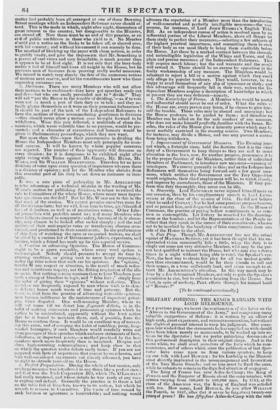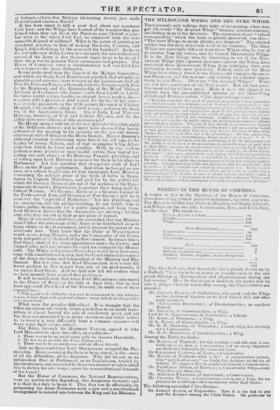MILITARY JOBBING: THE KING'S BARGAIN WITII LORD MELBOURNE.
Ix a previous page, we insert the continuation of the letter on the "Abuses in the Government of the Army," and comprising many valuable suggestions of Reform : it is written by un officer ef high rank, great experience, and extensive connexions, but without the slightest personal interest to warp his judgment. Our corre- spondent wished that the statements be has supplied us with should have been taken merely as memoranda, to be worked up into ar- tieles for the Spectator ; but we prefer publishiog documents of this profeesional description in their original shape. And in the mean while, we shall avail ourselves of facts which he com- municates, and of others which since the publication of last Spec- tator have come upon us from various quarters, to keep up our talk with Lord Howlett : for his Lordship is the Minister most directly implicated in the mismanagemeut and favouritism of the Tory Horse Guards; and on him must be fixed the onus, while he submits to remain in the dign:fied situation of scapegoat. The King of Frunce has nine Aidesede-Camp; the King of Prussia and the Emperor of Russia about the same number, with armies varying from e00,000 to 500,000 men. In 1783, at the close of the American war, the King of England was satisfied with ten. how many, Lord Howlett, du you allow Wisereet the Fourth, in 1837, after (let it never be forgotten) twenty-ono yeartof peace? He has fifty-four Aides-de-Camp with the rank of Colonel,—thirty-five Military (deducting hem, y just made Generals) and nineteen Naval f It has been usual to talk a good deal about our enormous Civil List ; and the Whigs have boasted of the wonders they per- formed when they cut doe n the Pensions some 70,000/. a sear : but what is the whole Civil List, as compared with the irre- sponsible disposal of millions? What is the power of granting an occasional pension, to that of making Generals, Culonels, and King's Aides-de-Catnp, by the score mid the hundred ? As far as the real influence of the Crown is concerned, the unconstitutional control a the Army is five thousand times more to be dreaded than the power to pension Court cormorants and paupers. The House of Commons votes a supplementary aild vast Civil List when it passes the Artny Estimates.
It was understood from the Report of the Military Committee, over which, we Wel:, Loid EBRINGTON presided, that all militory pluralities and sinecuies were to cease as the incumbeids died Now Sir EDWARD PAGE', a General, with the Twenty-eighth Feet for his Regiment, and the Governorship of the Royal Afilitary Academy at Sstelburst—the former worth from Leon/. to 1,4e01. the latter 1,000/. a year, besides an elegant house, garden, Sec.— tr sreover with a pension of 40n/. a year for the loss. a his artn- was wen:illy appointed, on the lith instant, Gevernor of Chelsea Hospital. with another salary of 500/.. a year ; and over the head, too, of Sir ALEN:ANDER HOPS:. Stated forth, Lord Visceunt HowIcK, Secretery at War awl Cebinet Minister, and let the public have your ("deem of this enormous job ! Mr.HUME spoke a leaf out of the last Spectator the other night at the Middlesex dinner ; and he must have observed the hearty adhesion of the meeting to his remarks on the present uncon- stitutional state of things at the Horse Guards. Honest JOSEPH'S abdicated vocation is returning upon him in his old age, in the 'heyday !of young Reform, and of that so-superior Whig Admi- nistration which he loves and glorifies. Well, he can seldom perform a more popular or more useful service than that of fer- lotting out such abuses as Sir EDWARD PAGET'S pluralism, and of calling upon Lord Howlers. to answer for them in his place in Parliament. Let him question that obsequious clerk of Lord on the PAGET appointment. And when he has got an an- swer, or a refusal to give one, let him interrogate Lord Howlett concerning the military plans of the fields of battle in Spain, drawn by Captain MITCHELL, awl paid for by the public, but which Sir GEORGE MuRRAy got out of the archives in the Quar- termaster Generars Department, to prevent their being used by Colonel NAPIER. Sir GEORGE MURRAY is a General, Colonel of the Forty-second Foot, and Governor of Fort George ; and he is moreover the " rejected of Perthshire :" but his pluralistn, and his sinecurism, and his pledge-breaking, do not entitle him to borrow public documents for a paltry purpose, and keep them. Lord Howleis. knows that the documents are miAug; let him elate why they are not in their proper place of deposit. Many of our leaders, duubtless, are astonished that any Minister should allow the patronage of the Army to be distributed so as to bring odium on the Government, and to increase the power of its inveterate foes. They know that the Duke of WEnetxGrox would never, being Premier, suffer the Cammander of the Forces to be independent of the head of the Government. In former times, Earl Gesx stickle(' fee every appointment under the Crown, and deemed office well lost because he (multi not command the House- hold. The Whi4s in CHARLES Fox's days would have been over- come with constitutional horror, had the 'Court claimed the control of the Army exelusive and independent of the Ministry awl Par- liament. 13ut it is plahl that Lord AIELnouneve is in a very dif- ferent position in this respect from any of his predecessors, if we except Lord Griey. And we shall now tell our readers what we have recently been assured that position is. It will be recollected, that when Lord MELBOURNE announced to the house of Peers, on the 18th of April 1833, that he had been appointed First Lott' of the Treasury, he made use of these expressions- ,. With regard to the ddlieultics that must be encountered by this Adminis- tration, I know them to be great ;rod arduous: many, indeed, are of a peculiar and a severe kind."
What were the peculiar difficulties? It is thought that the following statement—which, relating as it does to an occult trans- action, is almost beyond the pale of satisfactory proof, and yet has been conanunicated to us under ciicumetaeces which induce Os to receiee it very differently from a cennuon rumour—will throw SWLIC light on the subject.
The King, through Sir HERBERT TAYLOR, agreed to take Lord MELBOURNE spin into office, on conditions- !. There was to be no interference with the Queen's Household; Ile was to go on with the PEEL Peril:mem; !. There was to be no interference with the Queen's Household; Ile was to go on with the PEEL Peril:mem; 3. There was to be no interfireme with the Horse Guards.
And on these conditions Lord MELHoutrein accepted the Pre- miership. here, assuming the fates to be as stated, is the source of all his difficulties, all his disgraces. Whv did be not, as an
independent Peer of Parliameet, as an Englishman, trueted be his country men, and supported by them in a manner which enablea him to dictate his Own terms, spurn the unconstitutional demands of the Court ?
But the House of Commons, the Natienal Representatives, mere no parties to this degrading, this dangerous contract; and it is their first duty to break it. This they can do effectually, by postponing the Army Estimates until a new and a constitutional arrangement is entered into between the King and his Minister.



























 Previous page
Previous page